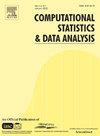多变量依赖结果的快速自回归模型及其在阿尔茨海默病和APOE-ε4脂质组学分析中的应用
IF 1.6
3区 数学
Q3 COMPUTER SCIENCE, INTERDISCIPLINARY APPLICATIONS
引用次数: 0
摘要
多变量组学结果的关联分析具有挑战性,因为结果变量之间具有高维性和相互相关性。在实践中,通常采用经典的多单变量分析方法,对每个结果使用线性回归模型,然后通过控制错误发现率(FDR)或家庭错误率(FWER)来调整多重性。虽然简单,但这些多单变量方法忽略了结果变量之间的依赖关系。这种疏忽导致统计推断不准确,其特点是功率较低,错误发现率增加,最终导致研究的可重复性降低。最近,先进的频率论和贝叶斯方法被开发出来解释这些依赖关系。然而,这些方法通常会给该领域的研究人员带来重大的计算挑战。为了弥补这一差距,提出了一种计算效率高的自回归多元回归模型,该模型明确地考虑了结果变量之间的依赖结构。通过大量的仿真表明,该方法比传统方法提供了更准确的多变量推理,并且即使在模型不规范的情况下仍然具有鲁棒性。此外,该方法还应用于研究载脂蛋白E (APOE)基因的ε4等位基因携带者和非携带者之间的血清脂质组学结果与阿尔茨海默病之间的相关性是否存在差异。本文章由计算机程序翻译,如有差异,请以英文原文为准。
Fast autoregressive model for multivariate dependent outcomes with application to lipidomics analysis for Alzheimer’s disease and APOE-ε4
Association analysis of multivariate omics outcomes is challenging due to the high dimensionality and inter-correlation among outcome variables. In practice, the classic multi-univariate analysis approaches are commonly employed, utilizing linear regression models for each individual outcome followed by adjustments for multiplicity through control of the false discovery rate (FDR) or family-wise error rate (FWER). While straightforward, these multi-univariate methods overlook dependencies between outcome variables. This oversight leads to less accurate statistical inferences, characterized by lower power and an increased false discovery rate, ultimately resulting in reduced replicability across studies. Recently, advanced frequentist and Bayesian methods have been developed to account for these dependencies. However, these methods often pose significant computational challenges for researchers in the field. To bridge this gap, a computationally efficient autoregressive multivariate regression model is proposed that explicitly accounts for the dependence structure among outcome variables. Through extensive simulations, it is demonstrated that the approach provides more accurate multivariate inferences than traditional methods and remains robust even under model misspecification. Additionally, the proposed method is applied to investigate whether the associations between serum lipidomics outcomes and Alzheimer’s disease differentiate in allele carriers and non-carriers of the apolipoprotein E (APOE) gene.
求助全文
通过发布文献求助,成功后即可免费获取论文全文。
去求助
来源期刊

Computational Statistics & Data Analysis
数学-计算机:跨学科应用
CiteScore
3.70
自引率
5.60%
发文量
167
审稿时长
60 days
期刊介绍:
Computational Statistics and Data Analysis (CSDA), an Official Publication of the network Computational and Methodological Statistics (CMStatistics) and of the International Association for Statistical Computing (IASC), is an international journal dedicated to the dissemination of methodological research and applications in the areas of computational statistics and data analysis. The journal consists of four refereed sections which are divided into the following subject areas:
I) Computational Statistics - Manuscripts dealing with: 1) the explicit impact of computers on statistical methodology (e.g., Bayesian computing, bioinformatics,computer graphics, computer intensive inferential methods, data exploration, data mining, expert systems, heuristics, knowledge based systems, machine learning, neural networks, numerical and optimization methods, parallel computing, statistical databases, statistical systems), and 2) the development, evaluation and validation of statistical software and algorithms. Software and algorithms can be submitted with manuscripts and will be stored together with the online article.
II) Statistical Methodology for Data Analysis - Manuscripts dealing with novel and original data analytical strategies and methodologies applied in biostatistics (design and analytic methods for clinical trials, epidemiological studies, statistical genetics, or genetic/environmental interactions), chemometrics, classification, data exploration, density estimation, design of experiments, environmetrics, education, image analysis, marketing, model free data exploration, pattern recognition, psychometrics, statistical physics, image processing, robust procedures.
[...]
III) Special Applications - [...]
IV) Annals of Statistical Data Science [...]
 求助内容:
求助内容: 应助结果提醒方式:
应助结果提醒方式:


